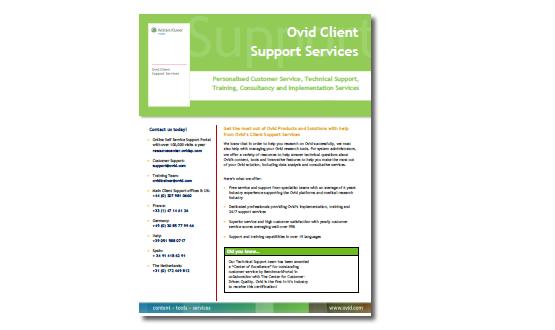Embase® Product Suite on Ovid®
Embase
The Embase database is the most trusted source of global, evidence-based pharmacological and biomedical research. Underpinned by the Emtree thesaurus — which provides comprehensive indexing and allows for precise biomedical and life science information retrieval — Embase features:
- • Disciplines and fields covered include: Pharmacology and Pharmaceutical Science; Pharmacoeconomics; Toxicology; Evidence-Based Medicine; Biotechnology and Bioengineering; Medical Devices; Drug Research and Development; Clinical Investigations; Public, Occupational, and Environmental Health Research and Policy Management; and more
- • Over 30 million bibliographic records dating back to 1947
- • All MEDLINE® citations
- • Records indexed from over 8,500 journals—over 3,000 of which are unique to Embase
- • International coverage—records drawn from sources published in over 90 countries
- • Constant updates—over 1.4 million citations and abstracts added annually
- • Fully-indexed citations, indexing terms, and codes
- • Author-written abstracts for roughly 80% of all citations
- • Drug and device indexing by trade name, manufacturer name, clinical trials, and more
- • Clinical Queries from McMaster University - Customized for Ovid!
Who Uses Embase in the Pharmaceutical Industry?
- • Research scientists involved in drug discovery or clinical trials
- • Drug regulatory specialists monitoring new rules and rule changes from the FDA or EMA
- • Marketers and market research professionals who need to monitor the competitive environment and forecast accurately
- • Information managers keeping track of current, international pharmacological literature for their colleagues
Clinical Queries from McMaster University - an Ovid Exclusive!
Developed by Ontario’s McMaster University as part of the Hedges Project - which was funded by the U.S. National Library of Medicine (NLM) - Clinical Queries are scientifically validated filters that generate precise search results in major clinical research areas.
Who Uses Embase in the Medical Device Industry?
- • Anyone researching the track record of competitors—Emtree links trade names to manufacturer’s name
- • Compliance officers monitoring regulatory requirements and safety data
- • Quality assurance groups implementing and monitoring testing and other quality processes
- • Basic scientists working in the lab—Embase indexes over 3,000 general and medical device terms
- • Device marketers seeking competitive intelligence
- • Display as search limits in the Ovid interface
- • Give users the flexibility to apply filters that achieve 1 of 3 types of search results:
-
- 1. Maximum sensitivity—retrieves the largest number of relevant results
- 2. Maximum specificity—retrieves somewhat fewer relevant articles but minimizes the number of irrelevant or lower-quality articles
- 3. Balance of sensitivity and specificity
- • Filters can be used with 8 purpose categories:
- • Causation (etiology) • Economics • Reviews
- • Clinical Prediction Guide • Prognosis • Therapy
- • Diagnosis • Qualitative
How are Clinical Queries developed?
- • Contributors include McMaster University research staff, NLM members, clinicians, and medical librarians.
- • Terms were compiled manually, using a peer-reviewed process, and filters were developed and validated using automated, computerized methodologies.
- For more information, visit http://hiru.mcmaster.ca/hiru/hedges/All-Embase.htm
Emtree - The Life Science Thesaurus
More than twice as large as the MeSH thesaurus of MEDLINE, Emtree is the unique and world-renowned controlled vocabulary used for Embase indexing. Designed specifically to enable users to retrieve the most complete and precise biomedical and pharmacological results, Emtree includes:
- • Over 70,000 preferred terms (more than 31,000 of which are drugs and chemicals)
- • More than 300,000 synonyms (over 190,000 of which are drugs and chemicals)
- • 7,500 explosion terms that define the hierarchical structure
- • Over 3,000 specific terms for general and medical devices (such as endoscopes, catheters, and prostheses), plus several thousand terms for related medical procedures (such as endoscopy and catheterization)
- • 78 subheadings—64 drug subheadings, including 47 routes of drug administration and 14 disease subheadings
- • 28 check tags for study types, including Randomized Controlled Trial, Systematic Review, and Diagnostic Test Accuracy Study
- • 10 check tags for study types as a topic, including Randomized Controlled Trial (Topic) and Systematic Review (Topic)
- • Links to over 23,000 CAS registry numbers
- • Covers all new International Non Proprietary Names (INNs) for drugs registered with the World Health Organization (WHO), as well as all US Adopted Names and NDAs (New Drug Approvals) listed by the Food & Drug Administration (FDA) and European Medicines Agency (EMA)
- • All MeSH terms, which are mapped to Emtree terms for seamless searching of the entire Embase database
Who Uses Embase in the Healthcare Industry?
- • Physicians, nurses, and students looking for clinical and evidence-based content—Emtree includes over 68,000 preferred terms for clinical retrieval
- • Clinical practitioners who want to provide the most informed patient treatment - over 2,500 journals and 6 million records are NOT available in MEDLINE
- • Anyone involved in or supporting clinical care — Clinical Queries filters automatically fine-tune clinical searches
- • Medical librarians conducting systematic reviews of evidence-based literature








